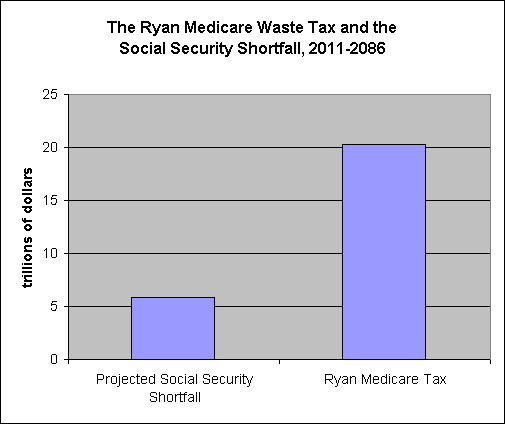Article
Fact-based, data-driven research and analysis to advance democratic debate on vital issues shaping people’s lives.
Center for Economic and Policy Research
1611 Connecticut Ave. NW
Suite 400
Washington, DC 20009
Tel: 202-293-5380
Fax: 202-588-1356
https://cepr.net
House Budget Committee Chairman Paul Ryan proposed a 2012 budget that would essentially end Medicare as we know it and replace it with a voucher system. The payments proposed under this plan would be far less than the payments Medicare is projected to pay, leading to large savings for the government.
However the Congressional Budget Office projects that costs to retirees would rise by far more than just the cutbacks in spending by the federal government. In addition to shifting the burden onto retirees, the Congressional Budget Office (CBO) projects that the Ryan plan will make the Medicare system much less efficient.
The CBO analysis projects that a Medicare equivalent plan will cost much more under the Ryan plan than if purchased through Medicare both because private insurers have much greater administrative costs and they would be less effective in constraining costs. (We know this, we have tried privatization before.) This additional cost is a pure waste from the standpoint of the economy as a whole.
The additional expense resulting from the Ryan plan is real money. Over the next 75-years (the planning period for Medicare and Social Security) the projections imply that the extra payments to the insurance and health care industry would come to $20.3 triliion if everyone purchased a Medicare equivalent policy. This is almost 4 times the size of the projected Social Security shortfall. That is equal to almost $70,000 for every man, women and child in the country.

Source: CBO, Social Security Trustees, and author’s calculations.
Note that this $20.3 trillion figure does not count the savings to the government from the lower Medicare payments. It is the pure waste that results from a having less efficient health care system in place for the Medicare population. We can think of this money as being equivalent to a tax since from an economic standpoint it has roughly the same impact on the economy if the government imposes taxes on the health care sector equal to $20.3 trillion, as if the inefficiency in the sector raises the cost of cost by care by $20.3 trillion. So we can view this $20.3 trillion as the Paul Ryan Medicare tax.